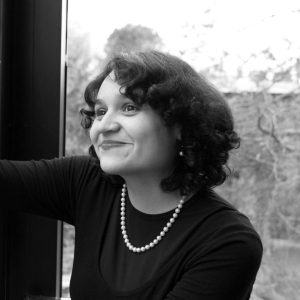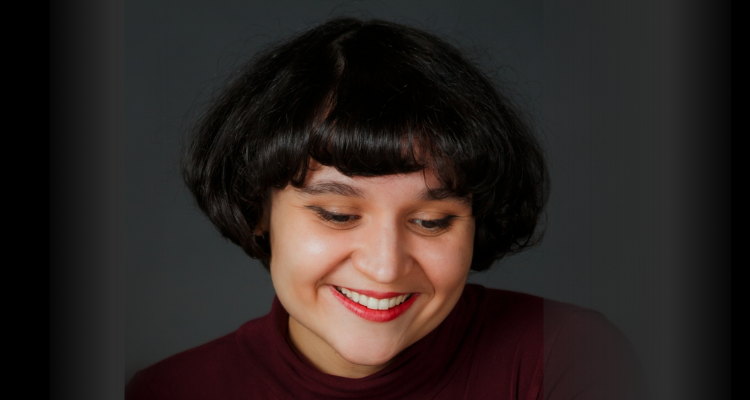 CMC Ontario Interim Regional Director Joseph Glaser sat down with HPO composer fellow and co-recipient of the 2021 Friends of Canadian Music Award, Maria-Eduarda Mendes Martins to discuss her participation in the Hamilton Philharmonic Orchestra Composer Fellowship program.
CMC Ontario Interim Regional Director Joseph Glaser sat down with HPO composer fellow and co-recipient of the 2021 Friends of Canadian Music Award, Maria-Eduarda Mendes Martins to discuss her participation in the Hamilton Philharmonic Orchestra Composer Fellowship program.
The program was launched in collaboration with the Ontario Region of the Canadian Music Centre in our 18-19 Season. The program is aimed at connecting early career composers with professionals in the orchestral world to nurture and develop new skills through mentorship and the creation of a new work.
On March 19th, 2022, the Hamilton Philharmonic Premiered Maria Eduarda’s work Echoing Mendelssohn conducted by Gemma New as the culmination of Maria Eduarda’s fellowship with the orchestra.
Joseph Glaser: Tell me a little bit about yourself, you grew up in Brazil and then moved to Canada. When did you move and what is your perception of the scene here in comparison?
Maria-Eduarda Mendes Martins: Yes, I grew up in Brazil (I spent my childhood in Rio de Janeiro and my adolescence in Porto Alegre), but my contact with the local music scene there was a bit brief. I started music late, at 16, and just did my undergraduate before moving to Victoria for my Master’s (also in music composition). I felt very welcome by the scene in Victoria, so much so, that I decided to stay there once I finished my degree. The University of Victoria doesn’t have a PhD program so I really had to make the decision of do I stay here or do I move right away to continue my studies. In the end, I was really glad I stayed because I was able to start my career in Canada and to have a number of life experiences that made me grow as a person. I immigrated, I got married to the composer Alex Jang, who inspires me every day and who supports me more than I could ever ask for, and I had my first jobs in music. Because of all these personal and musical experiences, now that I’m back in school I feel as though I’m not only a student, but I’m also doing a lot of work outside my studies.
JG: Since moving to Toronto, do you feel there’s a real difference in culture here than in Victoria?
MEMM: I feel they’re really similar! Both cities’ new music scenes are very open and welcoming. I think the big difference is that in Toronto I have more deadlines at the same time, whereas in Victoria I could work on some of my personal projects and compositions at my own pace. I’m definitely learning to compose more quickly this year.
JG: Can you tell me a bit about the piece? How does it relate to Mendelssohn?
MEMM: So, when I first got the fellowship, [composer mentor] Abigail [Richardson-Schulte] told me that my work would be on a concert called Gemma Conducts Mendelssohn. Abigail suggested that it would be a good idea to link my piece to this theme in some way. I had written this one work for orchestra before [Vortex Cantabilis] where I took a 13th century melody and created a “vortex” of the melody by having it passed from instrument to instrument and layered on itself in different time scales. I really liked the result of that piece so I decided to try that technique again, but this time using the melody from Mendelssohn’s Violin Concerto that was on the same program.

Excerpt of Vortex Cantabilis
JG: Aside from these two pieces, does your work often reference other music?
MEMM: Yes, for a lot of my music, the underlying impulse is melodic, and a lot of times those melodies are borrowed from other works or are suggestive of older music in some way (particularly of music from the Middle Ages). A lot of what I want to do in my music, by using unaccompanied melodies in conjunction with extended techniques, abstractions and other obscurations , is to say ‘Yes you can be both modern and incorporate the past at the same time’.
JG: What was the experience like working with the HPO?
MEMM: The HPO was great and [HPO music director] Gemma [New] is a fantastic collaborator! The orchestra was able to put the piece together in quite a short amount of time, after Gemma New and I discussed a few important points in the score and gestures to be highlighted in the next rehearsals She communicated these points at the beginning of the second rehearsal and the piece came together in 15 minutes! The concert experience was also truly magic: the piece sounded incredible and the musicians played with so much drive, energy and passion!
In addition to the rich performance and rehearsal experiences, I also had constant support from Abigail (HPO’s composer in residence), who guided me through an intense process of score and parts editing, who made sure I had a lot of experience with public speaking – through giving interviews, introducing my work from the stage, participating in big outreach events organized by the HPO, and who ensured that I had the space to talk about my piece and myself as a composer.
JG: What are some takeaways you have from this experience?
MEMM: One big takeaway is my sense of gratitude and good memories of the whole experience: I am really grateful for the amazing support that the HPO team gives to young composers who are part of their fellowship programs. I am so impressed with how their marketing team took the time to interview me and create such a complete profile of my compositional work for the community and concert goers. I have never felt so heard before, and I truly hope to be able to work with them again in the future.
In terms of learning experiences, I gained so much insight about livestreaming processes (which is becoming an increasingly important skill for composers). I learned new details about rehearsal procedures, etiquette and logistics, and I also became more aware of idiomatic differences between composing for orchestras and other ensembles, understanding that orchestral writing is a language on its own.

